Key takeaways:
- Privilege often operates unnoticed, highlighting the importance of recognizing systemic disparities and being an ally.
- Personal responsibility is tied to self-awareness, emphasizing the impact of our actions on ourselves and our communities.
- Acknowledging unearned advantages can motivate individuals to advocate for equity and support those with fewer resources.
- Accountability involves using one’s privilege to amplify marginalized voices and actively work towards dismantling barriers for others.
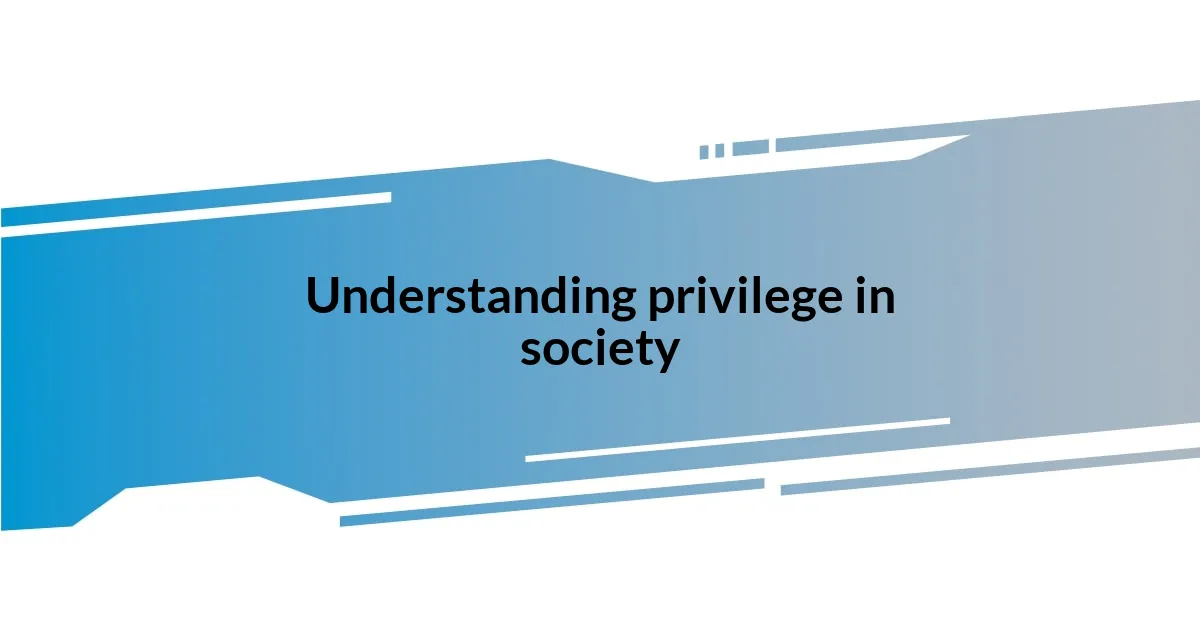
Understanding privilege in society
Privilege in society often hides in plain sight, influencing our experiences in ways we might not recognize. I remember the first time I truly understood this concept during a community discussion. Some shared stories of obstacles they faced simply because of their background, while I sat there, realizing how many doors had effortlessly opened for me because of my skin color and socio-economic status. It struck me—how often do we take these advantages for granted?
As I reflect on this further, I can’t help but wonder, what does it really mean to acknowledge privilege? It’s about more than just recognizing your own advantages; it’s about understanding the systemic issues that create disparities. The emotions that arise can be overwhelming. It’s discomforting to realize that my opportunities may come at the expense of others who don’t have the same support. This insight has challenged me to engage more deeply in conversations about equity and justice.
When I think about privilege, I often liken it to a vantage point from which we view the world. Some stand on solid ground, while others navigate rocky terrain. This metaphor resonates with me, as I’ve seen friends struggle against barriers that I never had to face. It begs the question: how can we leverage our privilege to uplift those around us? This journey isn’t just about awareness; it’s about transformation—learning to be an ally and advocate in a world that desperately needs it.
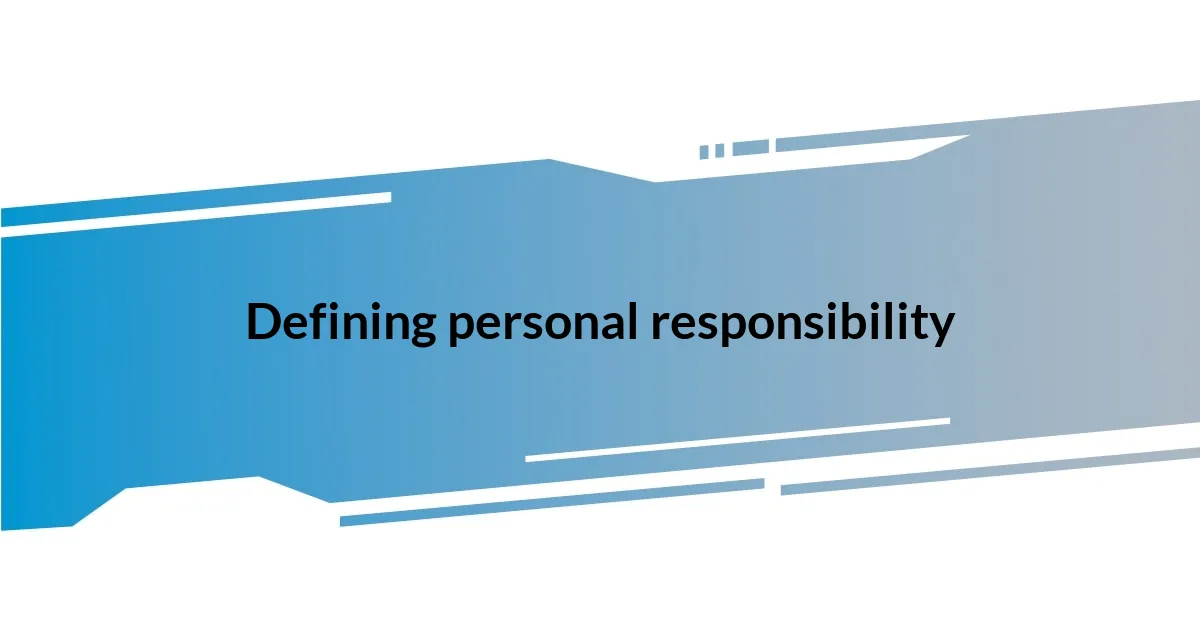
Defining personal responsibility
Defining personal responsibility can feel somewhat daunting, yet it’s essentially about owning one’s actions and their consequences. I’ve learned that this ownership transforms how we approach our daily lives. For instance, during a time when I failed to meet a deadline, I had to face the repercussions of my procrastination, realizing that my choices not only affected me but also my colleagues.
I believe personal responsibility is deeply intertwined with self-awareness. The more I reflect on my decisions, the clearer it becomes how important it is to not only recognize my strengths but also my shortcomings. This understanding connected me with a mentor who always emphasized taking accountability. While it was uncomfortable at first, embracing this mindset paved the way for personal growth and deeper relationships.
When considering personal responsibility, I often think about the ripple effect our choices can create. Just like throwing a stone in a pond, our actions can reach far beyond our immediate circle. I remember volunteering for a community cleanup; my simple act of responsibility sparked others to join in, leading to a day of transformation for our neighborhood. It reminded me that taking ownership can inspire action in others, creating a collective sense of responsibility.
| Aspect | Details |
|---|---|
| Ownership | Embracing actions and consequences |
| Self-awareness | Understanding strengths and weaknesses |
| Ripple effect | Actions’ influence on the community |
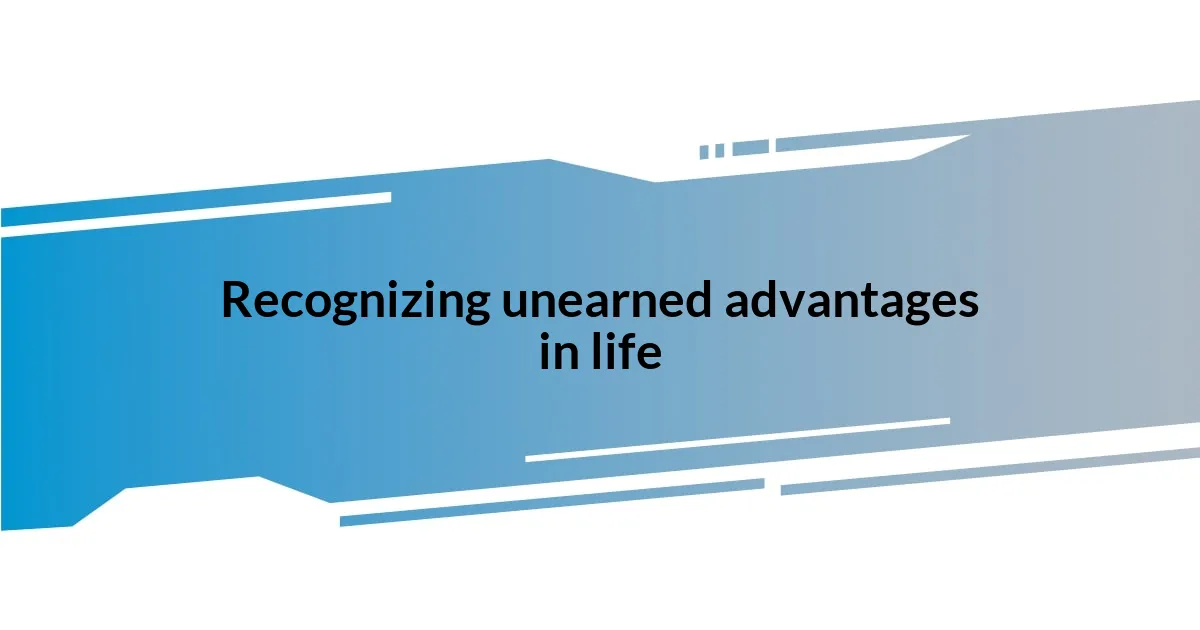
Recognizing unearned advantages in life
Recognizing unearned advantages in life often requires us to step outside our comfort zone. I remember a time during high school when a friend, who had to work multiple jobs to support his family, opened my eyes to the unspoken struggles many face. While I was focused on schoolwork, he juggled responsibilities that I barely understood at the time. This moment helped me realize that not everyone travels the same road, and some paths are paved with obstacles invisible to those of us who haven’t faced them.
It’s essential to identify specific unearned advantages, which can include:
- Access to quality education: Many receive educational resources that others lack, simply based on their zip code.
- Financial stability: Some grow up in households where money worries are minimal, allowing them to focus on opportunities.
- Social networks: Having connections with influential people can provide significant advantages in job searches or mentorship.
- Physical appearance: Societal standards often favor certain looks, impacting how individuals are perceived and treated.
- Health care access: Routine access to medical services can result in better health outcomes and opportunities for individuals.
Understanding these advantages can feel heavy. Yet, I find that engaging with this reality motivates me to make a difference wherever I can. The more I learn, the more I feel compelled to act in solidarity with those who navigate life with fewer privileges. It’s a mix of guilt and empowerment—guilt because I’m aware of my advantages, and empowerment because I can choose to use them to advocate for a fairer world.
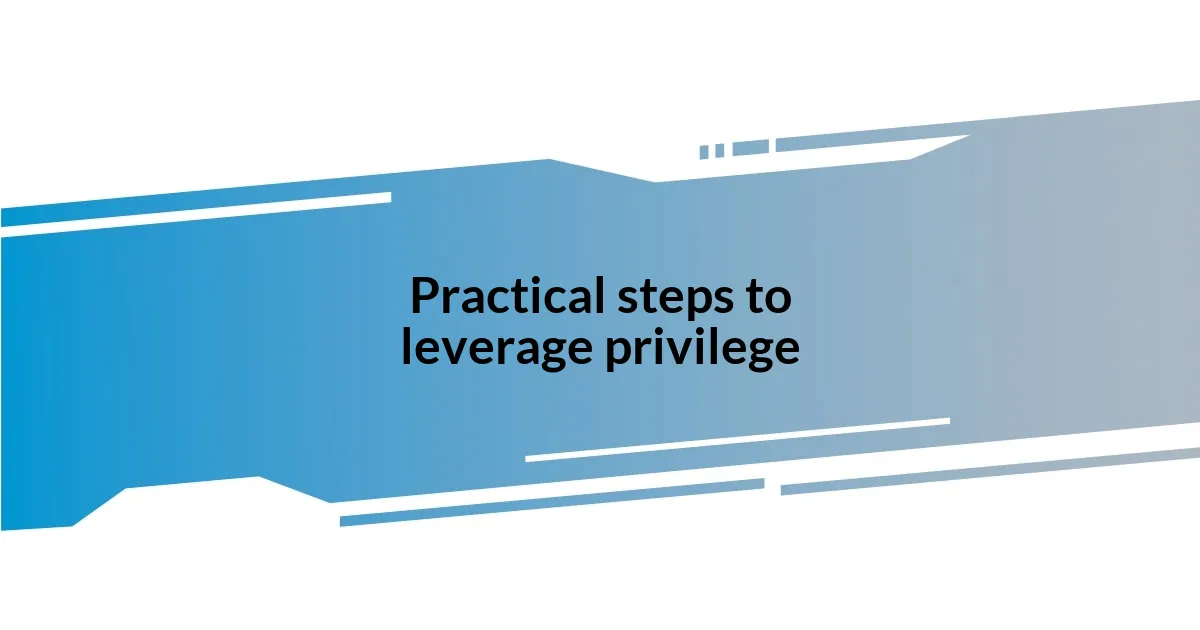
Practical steps to leverage privilege
Leveraging privilege effectively requires conscious effort. For instance, I once participated in an initiative where privileged individuals mentored underrepresented youth. Sharing my knowledge and insights not only helped them navigate challenges but also reminded me of the responsibility that comes with my position. How often do we consider the impact our experiences might have on someone else’s journey?
Another practical step is using your voice for advocacy. When I discovered a local organization fighting for policy changes in education, I realized my ability to rally support could amplify their efforts. By speaking up in community forums and sharing their mission on social media, I helped raise awareness about issues that often go unnoticed. The feedback was overwhelming; people felt motivated and inspired to contribute, illustrating how privilege can create a platform for collective change.
Lastly, consider the idea of resource sharing. I remember when I opened my professional network to a young entrepreneur from a marginalized background. I introduced them to potential clients and collaborators, which opened doors they might not have accessed otherwise. It’s a simple yet powerful reminder—what if we shifted our focus from ourselves to the potential we can unlock in others? The fulfillment I felt from this act still drives my commitment to actively engage with and support those around me.
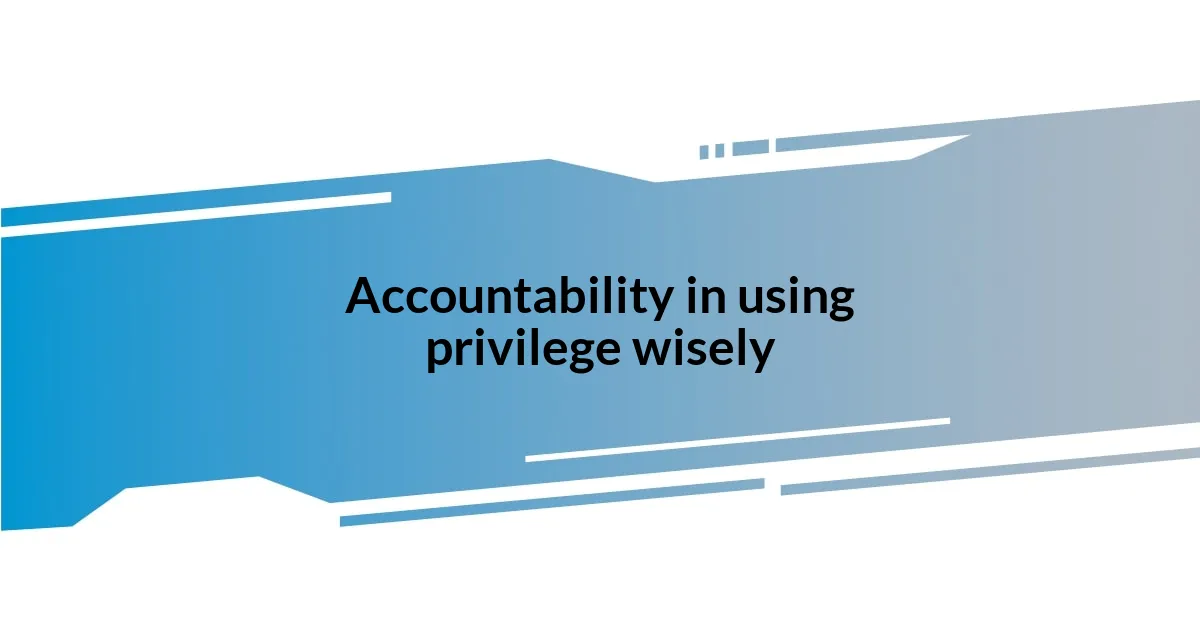
Accountability in using privilege wisely
Being accountable in using privilege means recognizing that our advantages come with responsibilities that extend beyond ourselves. I still remember a conversation I had with a colleague about the importance of using our platforms wisely. We both agreed that, as individuals with access to resources, we shouldn’t just enjoy the benefits. Instead, we need to amplify marginalized voices, ensuring they’re heard in conversations where they might otherwise be silenced. Isn’t it surprising how many people have remarkable insights but lack the opportunity to share them?
Accountability also involves continuous self-reflection. I once attended a workshop that challenged me to analyze my privilege and how I could apply it meaningfully. I realized that simply acknowledging my advantages wasn’t enough; I had to actively seek ways to dismantle barriers for others. It pushed me to ask myself: what concrete actions am I taking to level the playing field? I found that my obligation to advocate for equity grew stronger as I learned more about the daily experiences of those less fortunate.
It’s easy to get stuck in a mindset where we focus solely on our journeys. However, true accountability means showing up for others as well. For instance, during a community initiative, I encountered a mom struggling to navigate bureaucratic systems for assistance. I decided it was my responsibility to help her fill out forms and connect her with resources. That experience truly struck a chord with me. It wasn’t just about offering a helping hand; it was a profound realization that we can wield our privilege as a tool for positive change. How many lives could we touch if we all took the time to do the same?